Understanding the Landscape of Support and Caregiving
Caring for a parent experiencing cognitive decline involves navigating complex emotional, practical, and medical challenges. Adult children often find themselves at the forefront of this caregiving journey, balancing emotional support, safety concerns, and medical management. This article provides comprehensive guidance on educational resources, creating supportive environments, managing caregiver stress, and accessing available services to ensure the well-being of both the caregiver and the aging parent.
Educating Yourself About Dementia and Caregiving Practices
How can caregivers educate themselves about dementia and effective caregiving practices?
Caring for an aging parent with cognitive decline can be challenging, but education is a powerful tool to improve caregiving outcomes. Reputable sources like government websites (such as the Administration on Aging, Medicare, and Medicaid), the Alzheimer’s Association, and university programs offer extensive online resources, including courses, webinars, and educational materials.
These resources cover essential topics like managing daily routines, safety modifications, recognizing and understanding the stages of dementia, and employing effective communication strategies. For example, learning how to communicate with empathy and patience helps reduce frustration and fosters trust.
Participating in formal caregiver training programs and support groups can also develop practical skills and emotional resilience. These forums provide opportunities to share experiences, learn new techniques, and receive guidance from professionals.
Legal and financial planning are crucial parts of comprehensive education. Understanding power of attorney, healthcare directives, and financial safeguards helps in making informed decisions and ensures the aging parent’s needs are met.
Equally important is self-care for caregivers. Maintaining physical and emotional health, setting boundaries, and seeking support prevents burnout and sustains long-term caregiving efforts.
In summary, continuous learning through expert-reviewed materials and participation in structured programs equips caregivers with the knowledge and skills needed to provide compassionate, effective care for their loved ones.
| Resources | Focus Areas | Additional Details |
|---|---|---|
| Government Websites | Legal/Financial Planning | Services, guidelines, and legal forms |
| Alzheimer’s Association | Dementia Management | Educational articles, support groups |
| University Online Courses | Caregiving Skills | Webinars, tutorials, certification |
| Support Groups | Emotional Resilience | Peer sharing, expert advice |
Recognizing and Addressing Common Challenges
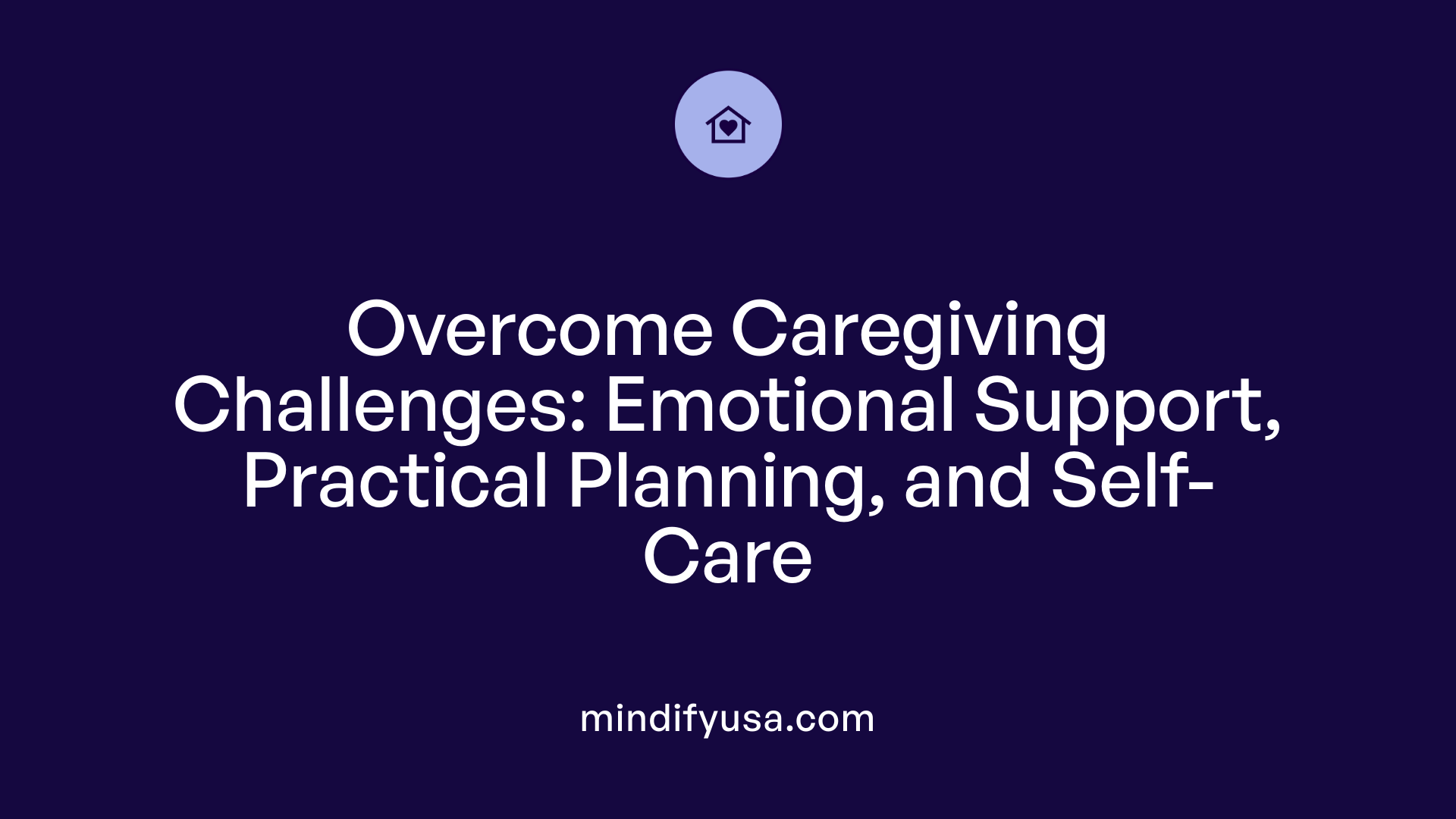
What are common challenges faced by adult children caring for cognitively declining parents, and how can they be addressed?
Caring for aging parents experiencing cognitive decline can be emotionally and practically demanding. Adult children may encounter behavioral issues such as aggression, wandering, or poor judgment, all of which pose safety risks. These behaviors can be distressing and require patience and specialized management strategies.
Emotional stress is a prevalent challenge, often leading to burnout, anxiety, depression, and social isolation. Feelings of grief and role reversal — becoming the caregiver instead of the child — can intensify these emotions, making self-care vital.
Practical difficulties include coordinating complex medical appointments, assisting with activities of daily living (ADLs), and navigating legal and financial matters like powers of attorney and estate planning. These tasks can be overwhelming without adequate information and support.
Physical health problems may also emerge, especially when caregiving involves physically demanding tasks. Additionally, financial strain from medical expenses and care services adds an ongoing layer of stress.
Addressing these challenges involves multiple approaches:
- Emotional support: Joining caregiver support groups through organizations like the Family Caregiver Alliance or AARP provides a network for sharing experiences and advice.
- Education: Learning about dementia progression, behavioral management, and available community resources can empower caregivers.
- Respite and support services: Utilizing respite care services allows caregivers to rest and recharge.
- Legal planning: Establishing legal documents such as power of attorney early ensures better management of care and financial decisions.
- Self-care: Prioritizing physical and mental health through regular activity, social engagement, and seeking professional help when needed.
By combining emotional support, education, practical planning, and self-care, adult children can better manage their caregiving roles and maintain their own well-being.
Utilizing Resources and Support Networks
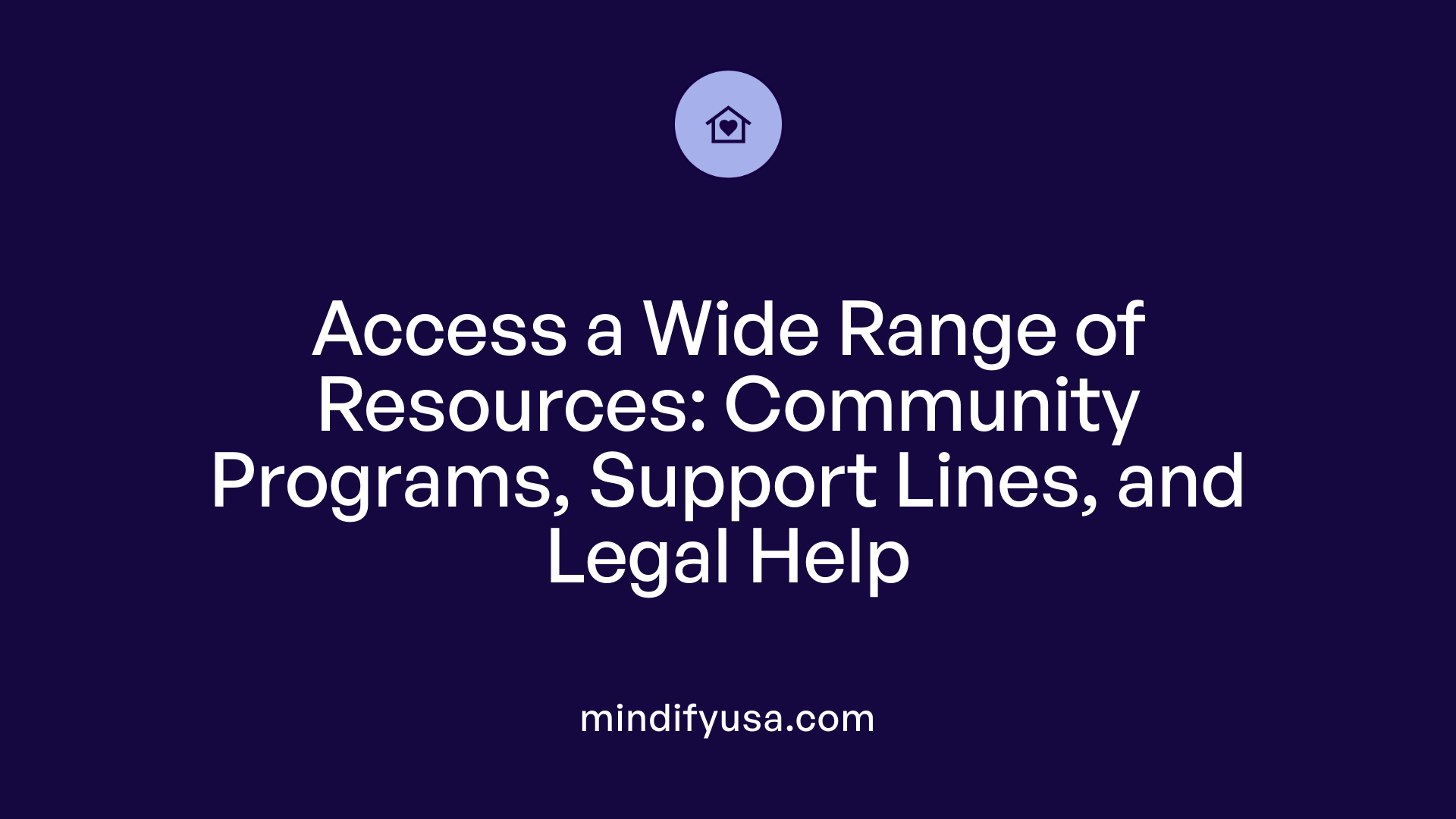
What resources are available to support adult children caring for parents with cognitive decline?
Caring for a parent experiencing memory issues or dementia can be challenging, but numerous resources exist to assist adult children in this journey. Federal and regional organizations offer extensive support covering legal, health, and daily care needs.
The U.S. Department of Health and Human Services, along with the National Institute on Aging and MedlinePlus, provides reliable information on safety modifications at home, understanding disease progression, and managing caregiver health. The Centers for Disease Control and Prevention (CDC) offers insights into preventative health strategies and community program options.
Local agencies, such as Area Agencies on Aging, play a critical role in connecting families with services like respite care, caregiver training, and mental health support. These agencies assess caregiver needs and facilitate access to community resources, tailored to specific geographic regions including Illinois and Texas.
National organizations also provide vital services. The Alzheimer’s Association and AARP are prominent sources of support, offering helplines, educational workshops, and online communities that address emotional stress and practical caregiving tips.
Furthermore, specialized centers and coalitions work to link caregivers with legal and financial services, including estate planning and healthcare directives. These resources help ensure that caregivers can plan proactively and access needed support without feeling overwhelmed.
In summary, adult children caring for a cognitively declining parent can leverage a web of support organizations, community programs, respite services, and legal resources to enhance both their parent’s quality of life and their own well-being.
Creating a Supportive Environment at Home
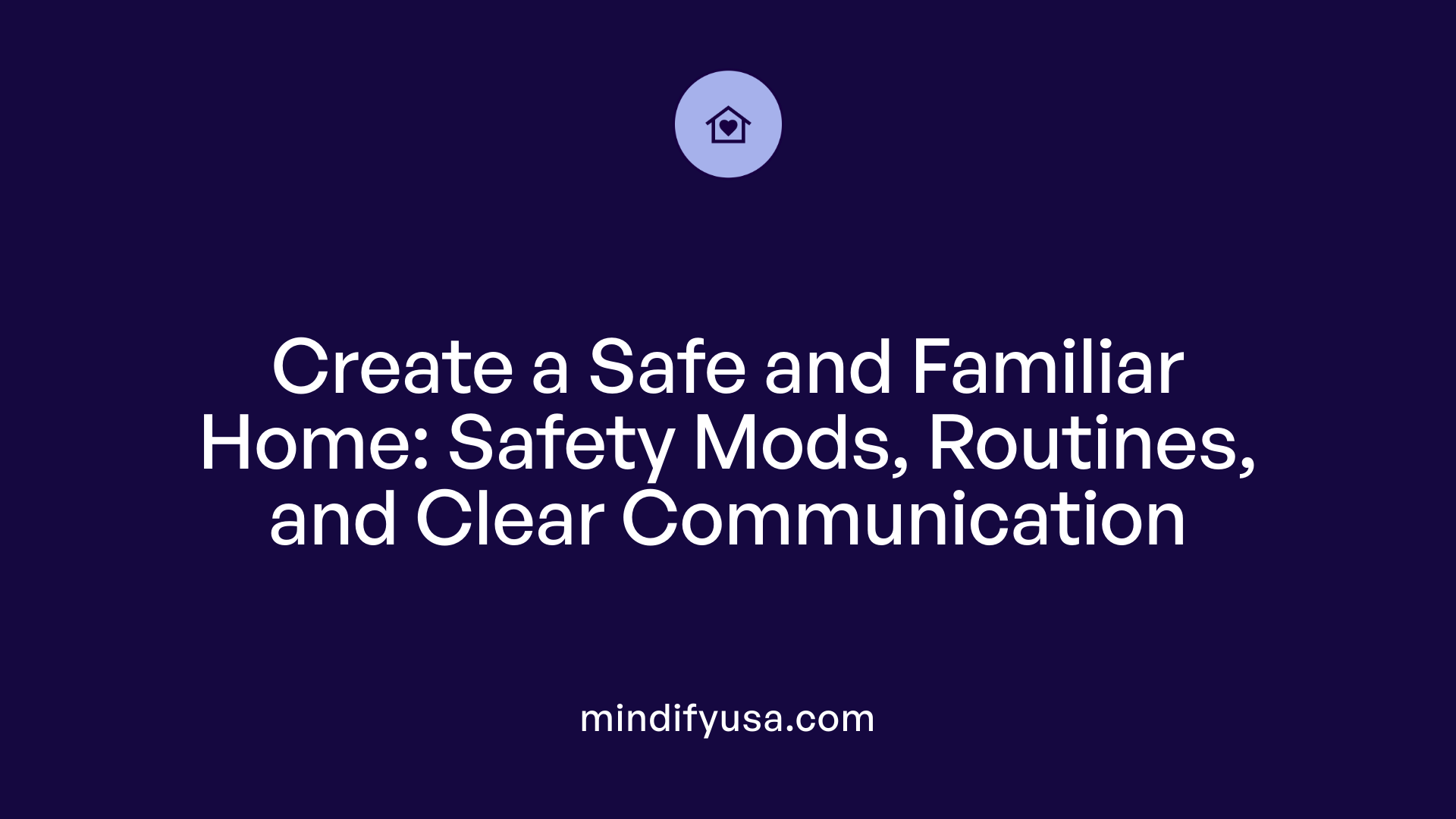 To help a parent experiencing cognitive decline, creating a safe and supportive home environment is crucial. Safety modifications are an essential first step. This includes removing trip hazards, installing grab bars and handrails, and labeling items around the house to foster independence and reduce confusion. Such adaptations can prevent accidents and promote confidence in daily activities.
To help a parent experiencing cognitive decline, creating a safe and supportive home environment is crucial. Safety modifications are an essential first step. This includes removing trip hazards, installing grab bars and handrails, and labeling items around the house to foster independence and reduce confusion. Such adaptations can prevent accidents and promote confidence in daily activities.
Maintaining familiar routines and surroundings can significantly ease anxiety and disorientation. Keeping consistent schedules and using familiar objects or photographs helps reinforce a sense of familiarity. For example, keeping cherished belongings in usual places and establishing predictable daily activities provide reassurance.
Clear and gentle communication improves understanding and reduces frustration for parents with early-stage dementia. Speaking calmly, using simple language, and explaining procedures or surroundings with patience can enhance cooperation and lessen anxiety. Being attentive to sensory impairments, such as hearing or vision loss, and adjusting communication methods accordingly, also makes interactions smoother.
Engagement activities tailored to individual interests and abilities support emotional and cognitive health. Encouraging social interactions, hobbies like gardening or reading, and physical activities such as walking or gentle exercise can stimulate the mind and body. Incorporating visual cues, like calendars or signage, aids navigation and task completion.
In addition, leveraging community resources such as memory care programs and support groups provides ongoing support for caregivers and seniors. Creating a dementia-friendly environment involves simple visual cues, adequate lighting, and predictable layouts, all aimed at fostering independence and emotional well-being.
| Strategy | Details | Benefits |
|---|---|---|
| Safety modifications | Remove hazards, install handrails, label household items | Prevent accidents, support autonomy |
| Familiar routines | Consistent daily schedules, preserve familiar objects | Reduce confusion, enhance security |
| Clear communication | Use simple language, explain with patience, consider sensory needs | Minimize frustration, improve understanding |
| Engagement activities | Social, hobbies, physical exercise, visual aids | Promote cognitive engagement, improve mood |
Managing Caregiver Stress and Building Resilience
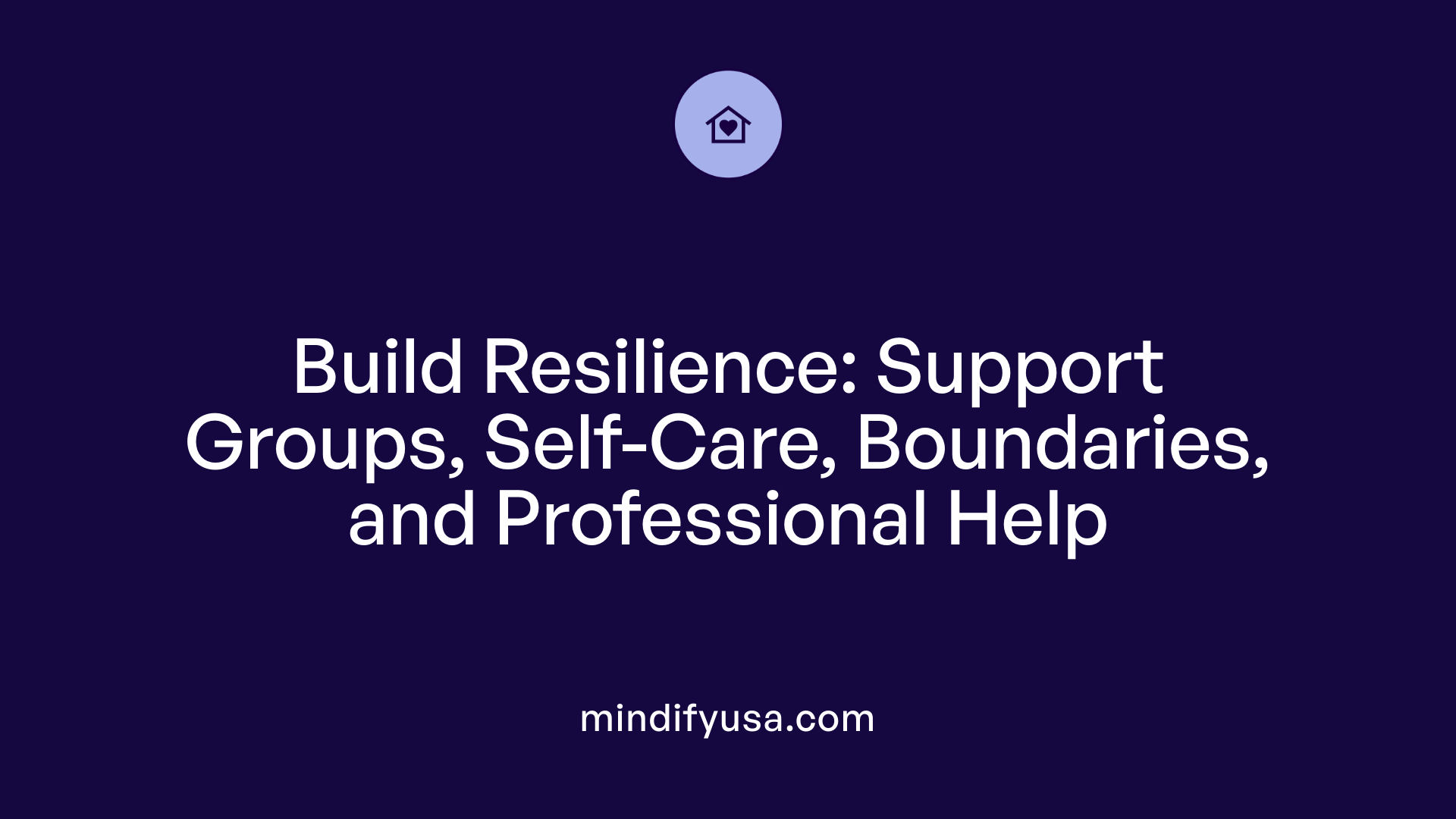 Caring for aging parents with cognitive decline often presents emotional and physical challenges for adult children. To sustain their well-being, caregivers can adopt various practices that help manage stress and prevent burnout.
Caring for aging parents with cognitive decline often presents emotional and physical challenges for adult children. To sustain their well-being, caregivers can adopt various practices that help manage stress and prevent burnout.
Support groups play a vital role in providing emotional relief and practical advice. Connecting with organizations like the Family Caregiver Alliance or local Alzheimer’s support groups allows caregivers to share experiences, gain insights, and feel less isolated. Online forums and community networks also offer accessible platforms for ongoing support.
Self-care practices are essential for maintaining health and resilience. Regular exercise, nutritious eating, adequate sleep, and relaxation techniques such as meditation or deep breathing can significantly reduce stress. Setting aside time for hobbies and social activities enhances emotional balance. Caregivers should prioritize their mental health, seeking professional help if feelings of depression or anxiety become overwhelming.
Establishing boundaries is crucial to preserve personal energy and prevent exhaustion. Clearly defining what is manageable helps caregivers avoid overcommitment. Enlisting help from family members or friends reduces individual burden and maintains harmony within the caregiving team. It’s important to communicate needs confidently and to decline additional responsibilities when necessary.
Seeking professional assistance is a proactive step. Counselors or therapists specializing in geriatric care can offer coping strategies tailored to individual situations. Healthcare providers can also help monitor physical and emotional health, providing referrals for mental health services or medical treatment if needed.
In summary, combining emotional support, self-care, boundary setting, and professional help creates a strong foundation for caregivers. These strategies empower adult children to manage their caregiving roles more effectively, ensuring their own health and the well-being of their aging parents.
The Role of Professional Interventions and Support Providers
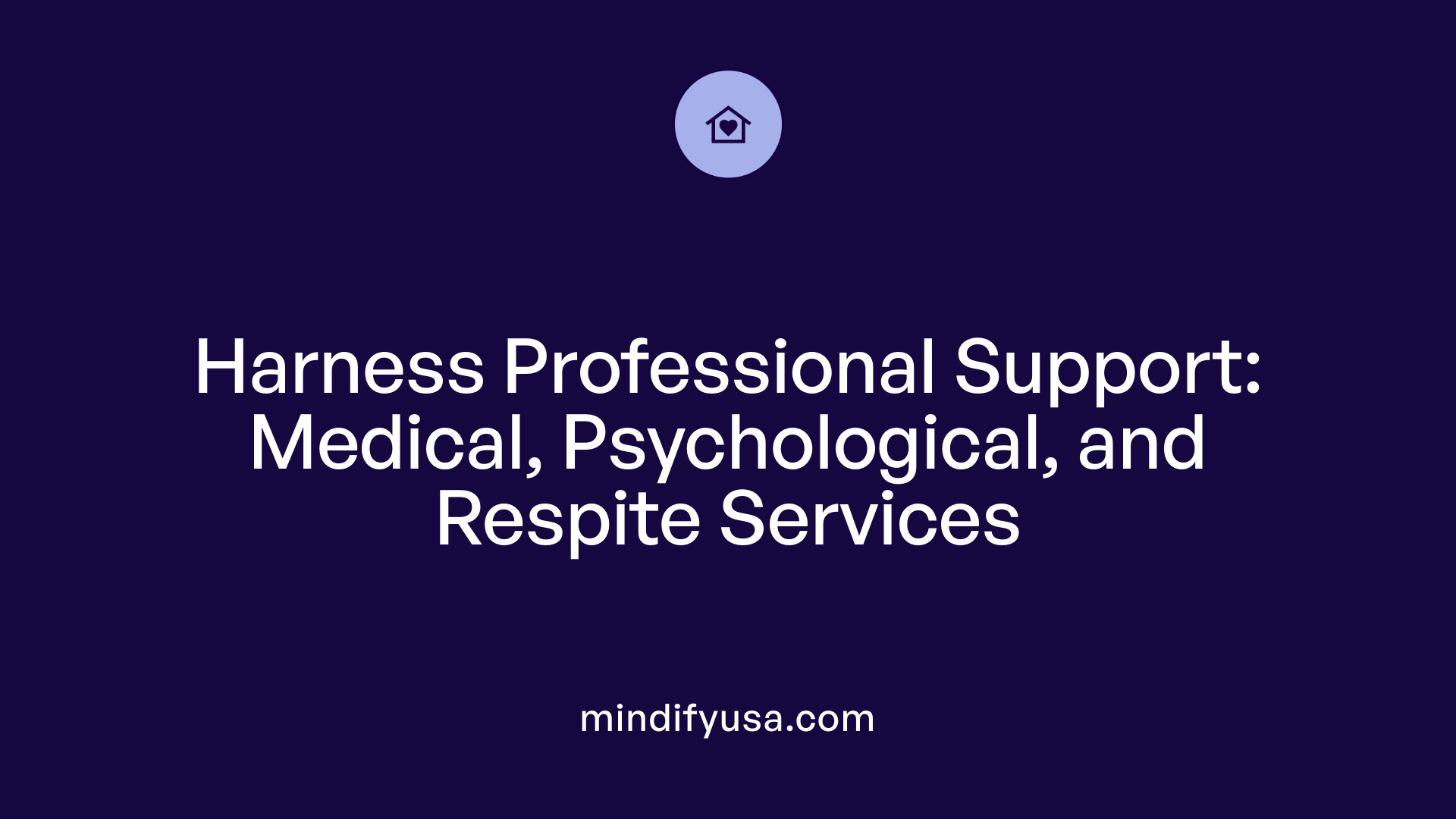
What types of professional interventions can assist families caring for someone with cognitive impairment?
Families caring for loved ones with cognitive decline, such as dementia or Alzheimer’s disease, benefit from various professional services designed to support both the individual and the caregiver. These interventions span medical, psychological, and social domains.
Medical management is a cornerstone of professional care, often involving medication to slow disease progression. For example, cholinesterase inhibitors and newer monoclonal antibodies are prescribed to enhance cognitive function and manage symptoms. Regular health assessments help in identifying and treating reversible causes of cognitive symptoms, ensuring comprehensive care.
Psychological and social interventions play an equally vital role. Counseling services offer emotional support, helping caregivers navigate stress, grief, and the emotional toll of caregiving. Support groups provide peer connection, enabling sharing of experiences and practical advice. Techniques such as reminiscence therapy can also boost mental engagement and emotional well-being for those with dementia.
In addition, non-pharmacological approaches are increasingly recognized for their benefits. Engagement in physical activities, cognitive training exercises, and social interactions help maintain cognitive abilities and improve quality of life. Multicomponent interventions combining these activities have shown promise in slowing the decline.
Respite care is an essential service that provides temporary relief for family caregivers. This can include in-home respite services or short-term stays in memory care facilities that foster specialized support, allowing caregivers to rest and recharge without compromising the care of their loved ones.
Counseling and support groups are accessible through various organizations such as the Alzheimer’s Association, Family Caregiver Alliance, and local community health programs. These services help caregivers manage stress, develop effective communication strategies, and maintain their own mental health.
| Intervention Type | Description | Benefits | Additional Notes |
|---|---|---|---|
| Medical Management | Medications and health assessments | Slow disease progression, manage reversible causes | Pharmacological and clinical monitoring |
| Psychological Support | Counseling, support groups, reminiscence therapy | Emotional relief, social connection | Facilitated by trained professionals |
| Non-pharmacological Strategies | Physical activity, cognitive training, social engagement | Maintain cognition, improve mood | Community programs, home activities |
| Respite Care | Temporary relief services | Reduce caregiver stress, prevent burnout | In-home or facility-based |
| Counseling & Support Groups | Emotional and peer support | Stress management, resource sharing | Offered by community organizations |
Efficient care for cognitively impaired loved ones involves a mesh of these professional interventions, tailored to the individual's needs. Collaborating with multidisciplinary dementia care teams ensures comprehensive management, fostering both health and emotional well-being for seniors and their families.
Enhancing Support Through Professional and Workplace Policies
Supporting adult children who care for aging parents with cognitive impairments requires comprehensive strategies that address both their emotional needs and practical responsibilities.
Caregiver education programs are essential for offering tailored information about dementia and effective care techniques. For example, California's Caregiver Resource Centers and the Family Caregiver Alliance provide specialized training, counseling, respite care options, and legal guidance. These programs aim to empower caregivers by enhancing their understanding of the progression of cognitive decline and teaching communication strategies suited for early-stage dementia.
Workplace accommodations play a critical role in supporting working caregivers. Policies such as flexible work hours, telecommuting options, and paid leave allow employed caregivers to balance their job responsibilities with caregiving duties. Recognizing caregiving as a legitimate work-related concern reduces stress and helps maintain productivity without compromising the quality of care.
Resource referral and advocacy are vital components of caregiver support. Professionals providing care or guidance should connect caregivers to local and national services, including Area Agencies on Aging, support groups, and community programs offering transportation, meal delivery, and emergency assistance. Facilitating access to these resources helps caregivers manage daily challenges more effectively.
Training for caregivers, especially those new to the role, can improve confidence and caregiving quality. Education sessions can cover topics such as managing agitation, understanding medical care plans, and coordinating with healthcare providers. These training opportunities also foster community and reduce feelings of isolation.
Effective support for caregivers can be summarized in a table:
| Support Area | Examples of Resources | Impact |
|---|---|---|
| Education | Caregiver training programs, online courses | Better understanding of dementia and care techniques |
| Workplace Policies | Flexible hours, remote work, paid leave | Reduced stress, better work-life balance |
| Community Resources | Support groups, meal programs, transportation services | Practical help, emotional support |
| Professional Support | Counseling, legal advice, respite services | Emotional well-being, physical health preservation |
Addressing the needs of caregiver families comprehensively—through education, workplace efforts, and resource connections—can help ease the emotional and physical toll of caregiving. Encouraging ongoing training and support ensures caregivers are well-equipped to handle evolving challenges, ultimately improving quality of life for both caregivers and their aging parents.
Empowering Caregivers for Long-term Success
Supporting adult children caring for parents with cognitive decline requires a comprehensive approach that includes education, emotional support, resource utilization, and proactive planning. Building awareness about dementia, creating safe and engaging environments, managing stress effectively, and fostering collaboration with professionals and community organizations are vital steps. By embracing these strategies, caregivers can better navigate the emotional and practical aspects of their role, ultimately ensuring a higher quality of life for both themselves and their parents. Empowered with knowledge, resources, and support, adult children can foster resilience and provide compassionate, effective care across the spectrum of cognitive decline.
References
- Caring for Aging Parents: An Essential Guide
- Messaging to adult children with concerns about a parent's ...
- Adult Children of Aging Parents: A Guide for Counselors
- 40 Resources for Adult Children Caring For Aging Parents
- Top 10 Tips for Adult Children Navigating Memory Care ...
- Loving an Aging Parent
- How to Deal With Negativity in Elderly Parents
- Mental Health Across Generations: How to Support Aging ...





































































































